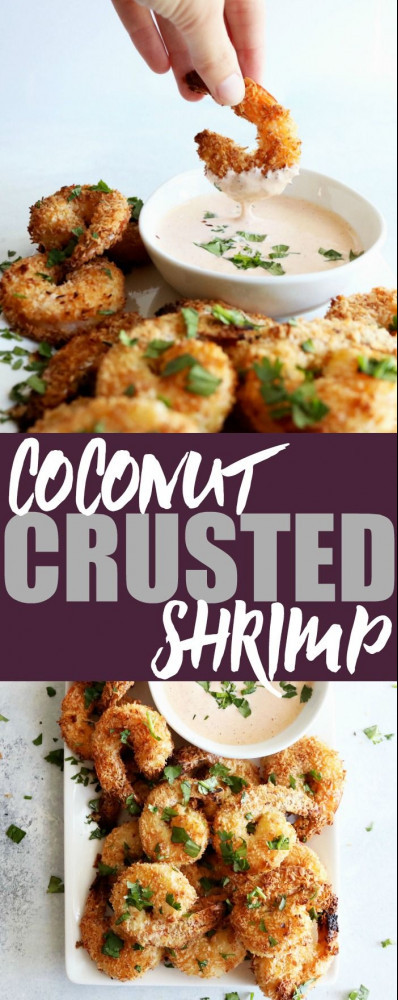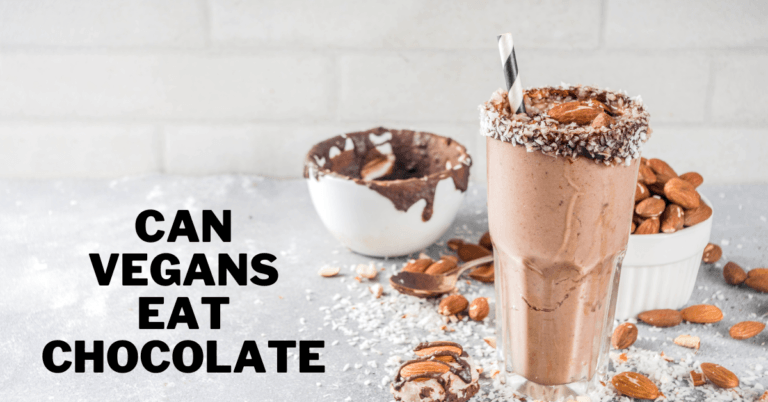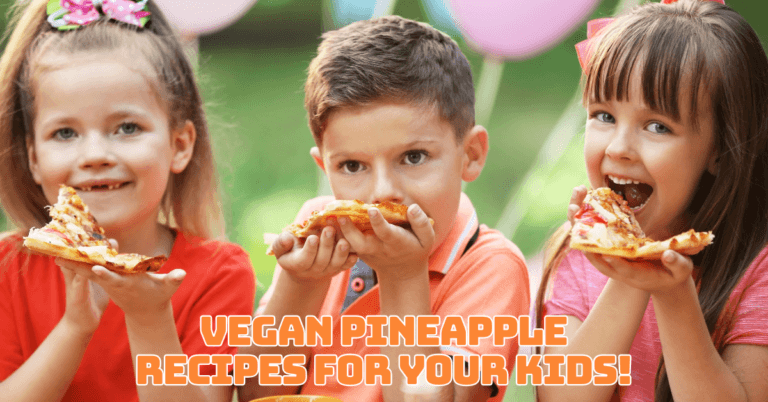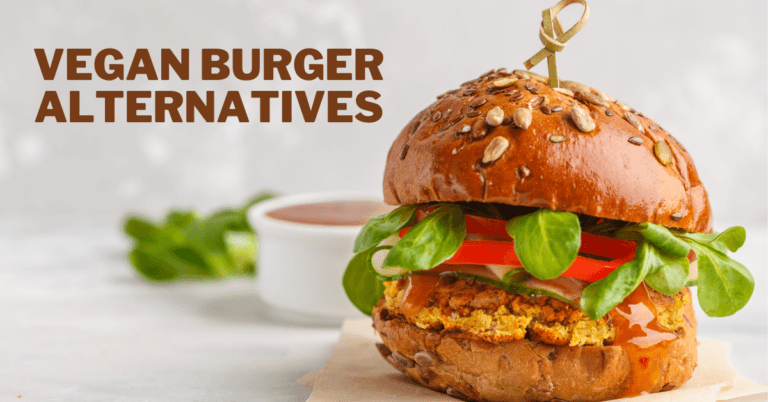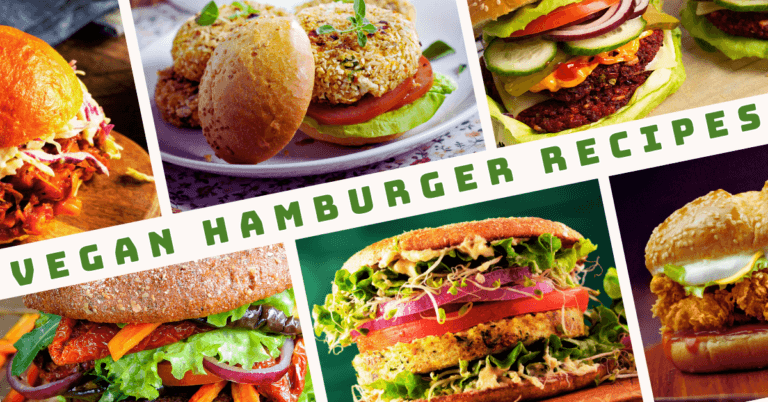An Overview Of What Vegans Eat Daily
An Overview Of What Vegans Eat Daily
In a world where dietary choices are as diverse as the cultures that populate our planet, the vegan lifestyle emerges as a compelling and compassionate path to nourishment.
Unlike the perception of deprivation that sometimes surrounds veganism, it's a culinary journey filled with flavours, textures, and ethical choices.
Veganism transcends the mere avoidance of animal products; it's a celebration of the rich tapestry of plant-based ingredients that nature bestows upon us.
In this exploration of what vegans eat daily, we uncover a world of delectable dishes, healthful choices, and the profound impact of a good diet on our bodies and our planet.
In a symphony of fruits, vegetables, grains, nuts, and legumes, vegans find both the sustenance and the joy of a diet that aligns with their values and honours the Earth's bountiful offerings.
Welcome to the vibrant, kind, and delicious world of vegan food, where each mouthful is a deliberate move toward a better present and a more sustainable future.

What Is A Vegan Diet?
A vegan diet is like a botanical orchestra, where the menu is a symphony of plants. It's a dietary masterpiece that shuns the consumption of animal-derived foods, directing the spotlight onto a cast of vibrant fruits, vegetables, legumes, grains, nuts, and seeds.
In the world of veganism, there are no meaty ballads, no dairy-infused concertos, and no egg-based arias. Instead, it's a celebration of the harvest's bounty, where every meal is a crescendo of flavours and nutrients.
This diet isn't just about what's excluded, though—it's about the grand inclusion of nature's finest offerings. On this verdant stage, you'll find a chorus of vitamins, minerals, fibre, and antioxidants, harmonizing to create a nourishing and healthful experience.
But a vegan diet isn't confined to the realm of nutrition; it's also a movement. It's a stance for the ethical treatment of animals, a call for environmental harmony, and a path to personal wellness.
Beyond the plate, it extends to the wardrobe, makeup bag, and home, embracing cruelty-free, eco-conscious choices. A vegan diet isn't just a way of eating. It's a musical ode to a more compassionate and sustainable world.
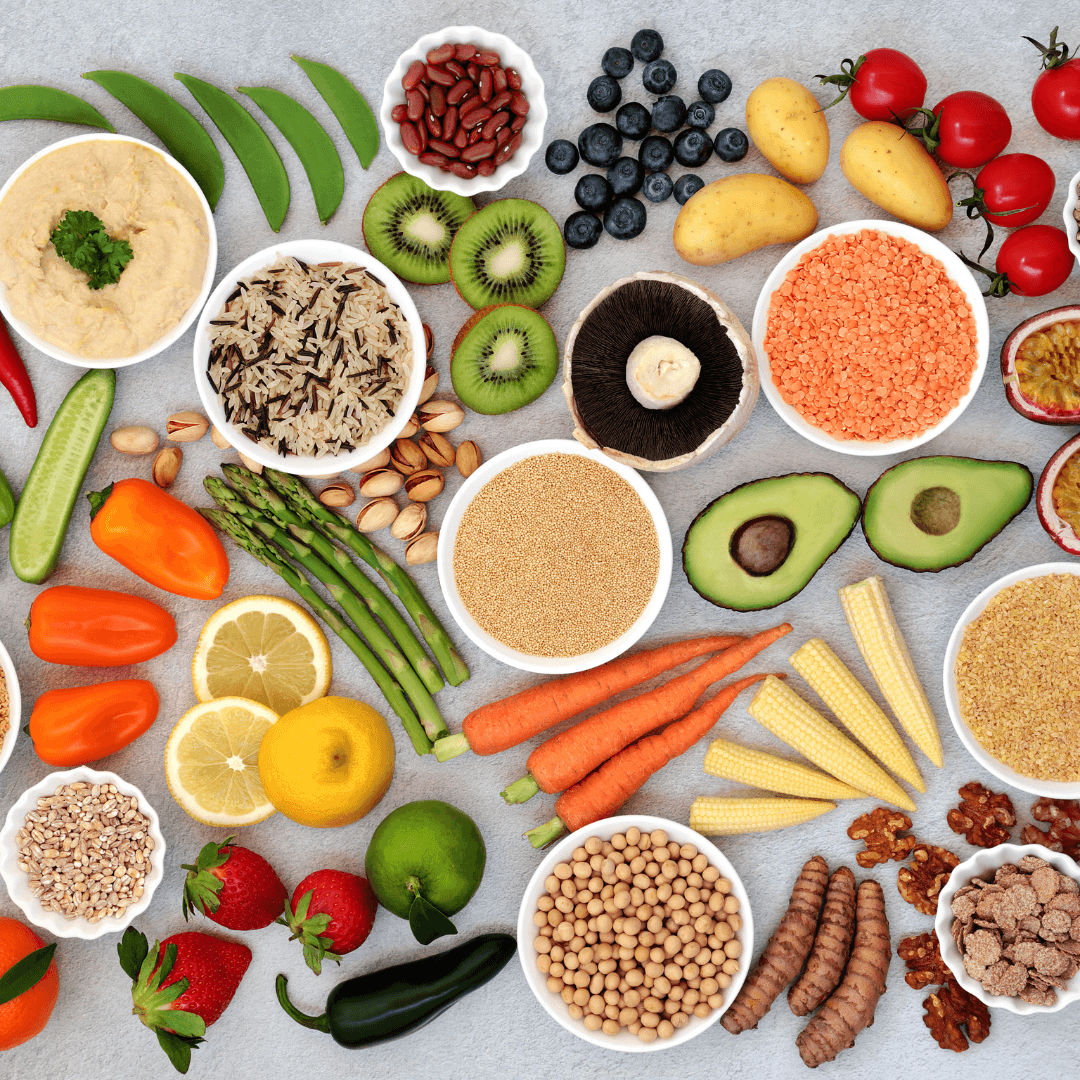
Types Of Vegan Diets
Vegan diets are as diverse as a colourful garden in full bloom. It's not a one-size-fits-all approach but a vibrant tapestry of choices to suit various preferences and ethical convictions. At the heart of this garden are different types of vegan diets, each with its unique blossoms.
1. Traditional Vegan Diet
The traditional vegan diet, known as a “whole-foods plant-based diet,” is like a well-pruned rose garden, focusing on natural, minimally processed foods.
It's rich in fruits, vegetables, legumes, grains, nuts, and seeds, making it a haven for health enthusiasts.
2. Raw Vegan Diet
The raw vegan diet is sprouting alongside, where the garden bursts into a riot of uncooked, unprocessed beauty. It's an orchard of unheated fruits, vegetables, nuts, and seeds, believed to retain more nutrients and enzymes. This diet is a garden of vitality.
3. High-Carb, Low-Fat Vegan Diet
Then there's the high-carb, low-fat vegan diet, a fruit-filled grove with starchy goodness, popularized by figures like Dr. John McDougall and Dr. Douglas Graham.
Its diet revolves around grains, legumes, fruits, and tender leafy greens, offering simplicity and satiety.
4. Junk Food Vegan Diet
Another flower in this garden is the junk food vegan diet. This wild meadow has vegan versions of indulgent treats like burgers, fries, and ice cream.
While it's less about health and more about indulgence, it's a space for those who seek familiar comforts without the animal ingredients.
5. Whole-Food Plant-Based Vegan Diet
Lastly, there's the whole-food, plant-based vegan diet. It's an exquisite formal garden where every plant and nutrient is cultivated precisely, often with specific health goals.
Think of it as the Zen garden of the vegan world, harmonizing wholesome foods to attain peak well-being.
These vegan diets offer a bouquet of choices, allowing individuals to align their eating habits with their health objectives and ethical principles. It's a garden where diversity and compassion flourish.
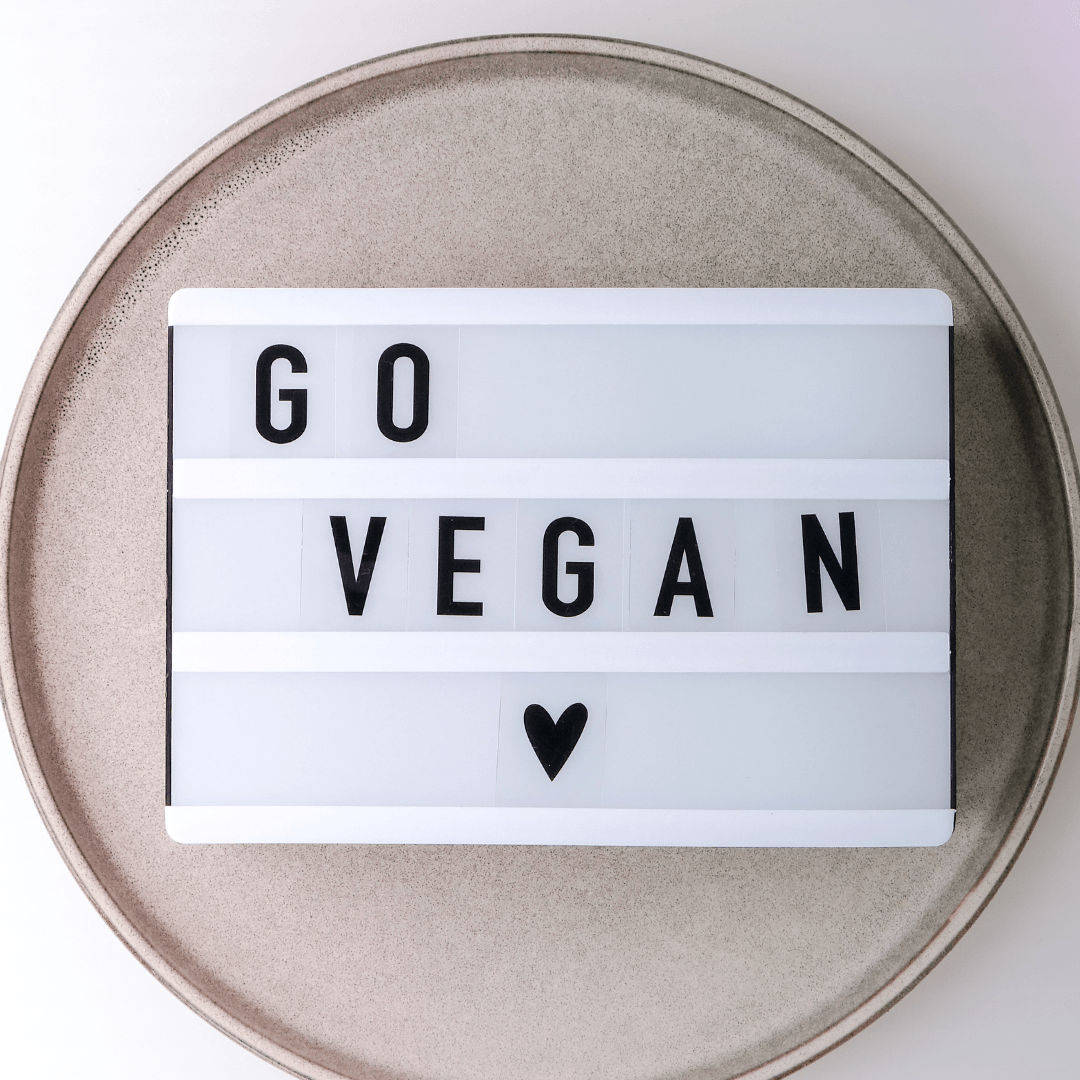
Why Go Vegan?
Going vegan is not just about what you're giving up but what you gain—personally, environmentally, and ethically. It's a conscious choice to tread more lightly on our planet.
When you go vegan, you reduce your carbon footprint, conserve water, and preserve precious ecosystems. But it's not just about saving the world; it's also about protecting yourself.
A vegan diet can lead to better heart health, a lower risk of certain cancers, and a potential boost in energy. It's a path to culinary exploration, with a rainbow of fruits, vegetables, grains, and legumes awaiting your taste buds.
Going vegan means you stand for compassion, not just for domesticated animals but all sentient beings. It's a stance against the suffering, cruelty, and exploitation inherent in animal agriculture.
In a world where your choices can make a difference, going vegan is your way of saying, “I choose kindness over cruelty, sustainability over depletion, and well-being over indifference.”
For many, the ethical foundation of veganism is a driving force. They decide to become vegans to stop aiding the suffering and exploitation of animals used in the production of food, clothing, entertainment, and cosmetics.
It's a belief in the inherent value of all sentient beings and a commitment to nonviolence. The environmental impact of animal agriculture is significant.
Those who go vegan often do so to reduce their carbon footprint, decrease water usage, protect biodiversity, and combat deforestation. Veganism aligns with a commitment to a sustainable future.
A vegan diet, when well-balanced, can offer a wide range of health benefits. It can lead to lower cholesterol, reduced risk of heart disease, lower blood pressure, and a healthier body mass index.
Additionally, it may reduce the risk of certain types of cancer. For some, going vegan is a way to control their health. Choosing nutrient-rich, plant-based foods that promote vitality and well-being is a conscious choice.
It's an empowering decision to invest in one's health and longevity. In a world where our choices significantly impact the planet and its inhabitants, veganism is a conscious decision to align one's life with one's values, whether compassion, sustainability, health or a combination of these factors.
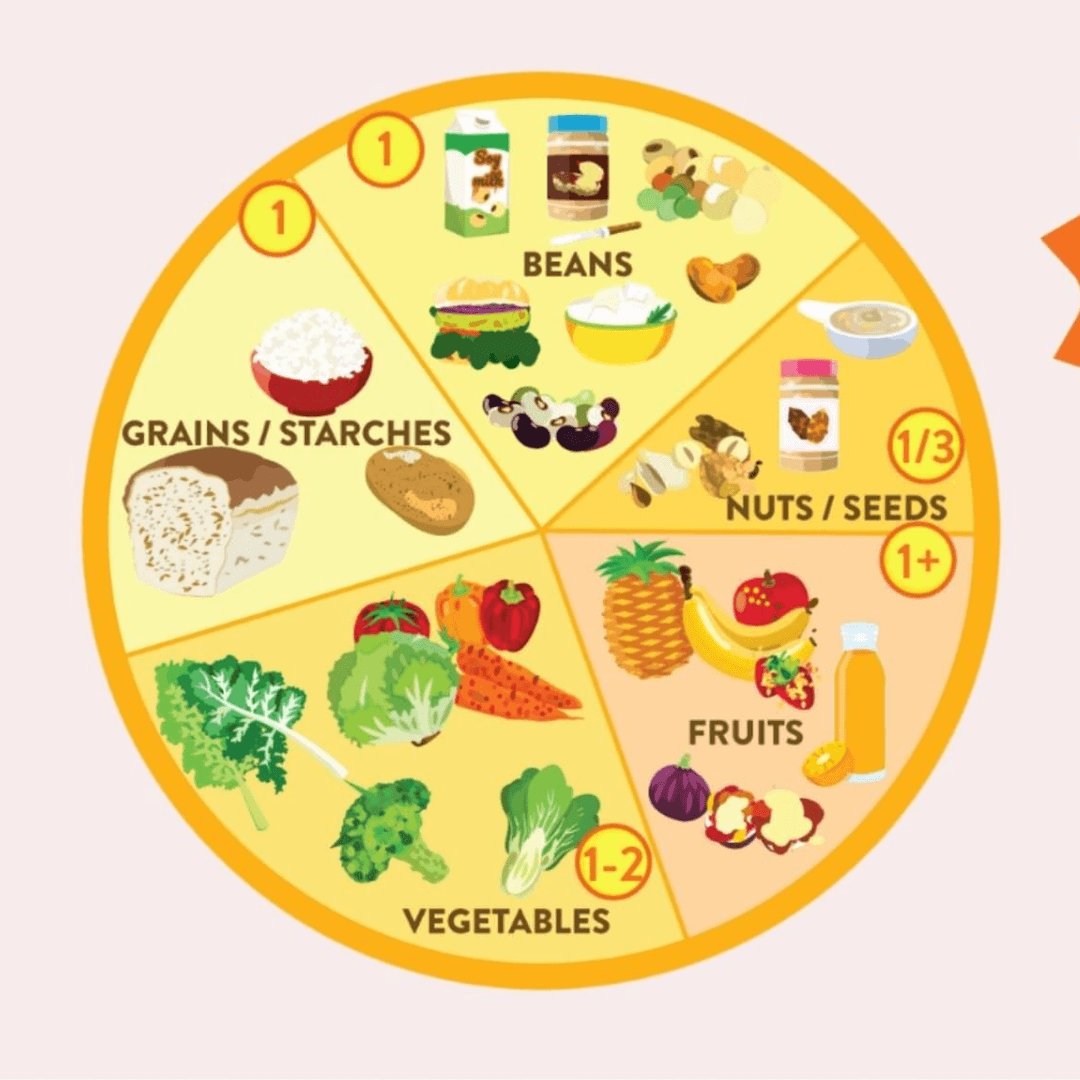
The Vegan Plate Method
The Vegan Plate Method is a simple and practical way for vegans to plan balanced and nutritious meals. It visually represents constructing your plate with different food groups to meet your nutritional needs.
Here's how it works:
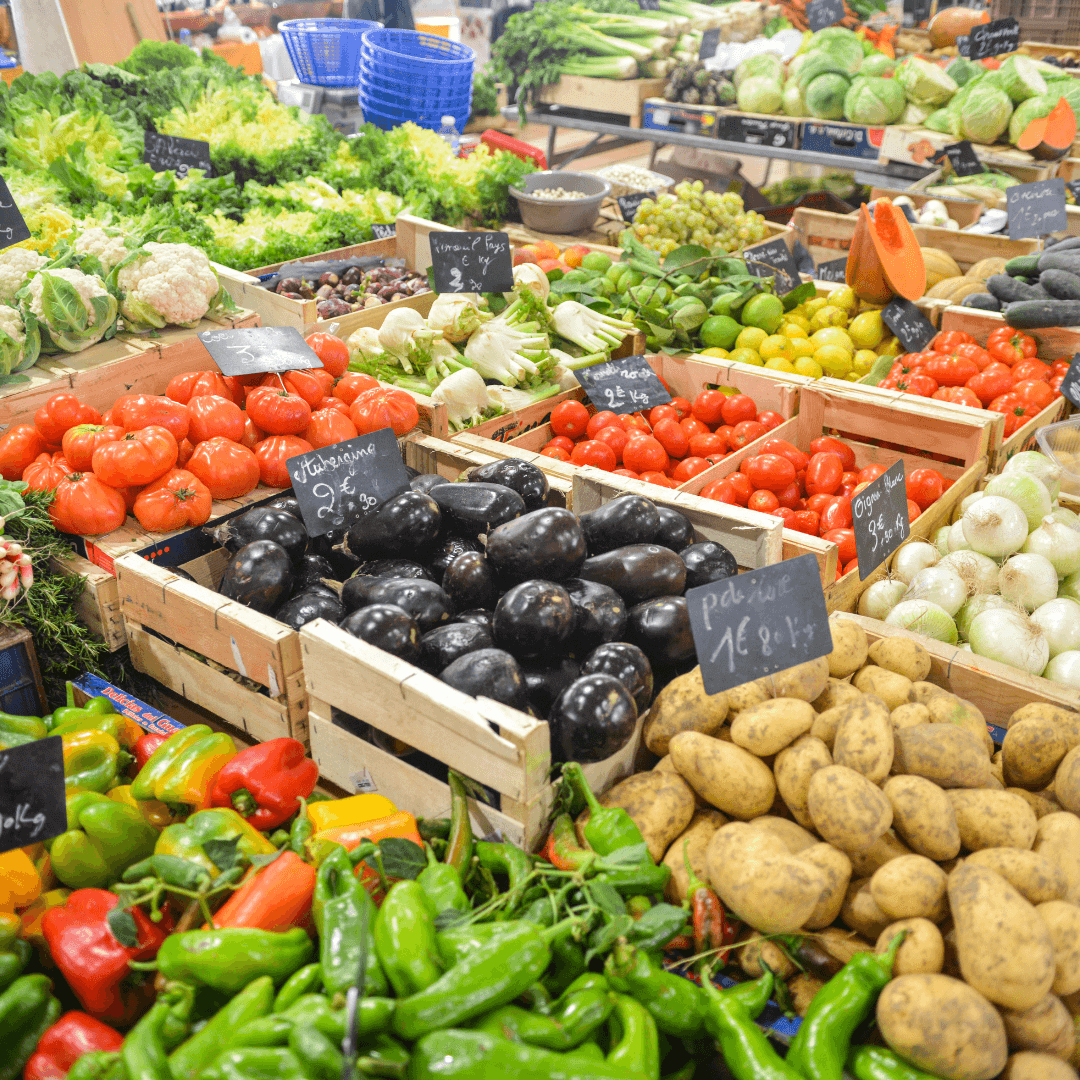
1. Vegetables
Fill half your plate with various colourful and leafy vegetables. These should be a prominent part of every meal, providing essential vitamins, minerals, and fibre.
2. Starchy Foods
Allocate about a quarter of your plate to starchy foods like whole grains (brown rice, quinoa, whole wheat pasta), starchy vegetables (potatoes, sweet potatoes), and legumes (beans, lentils). These foods supply complex carbohydrates for energy and additional fibre.
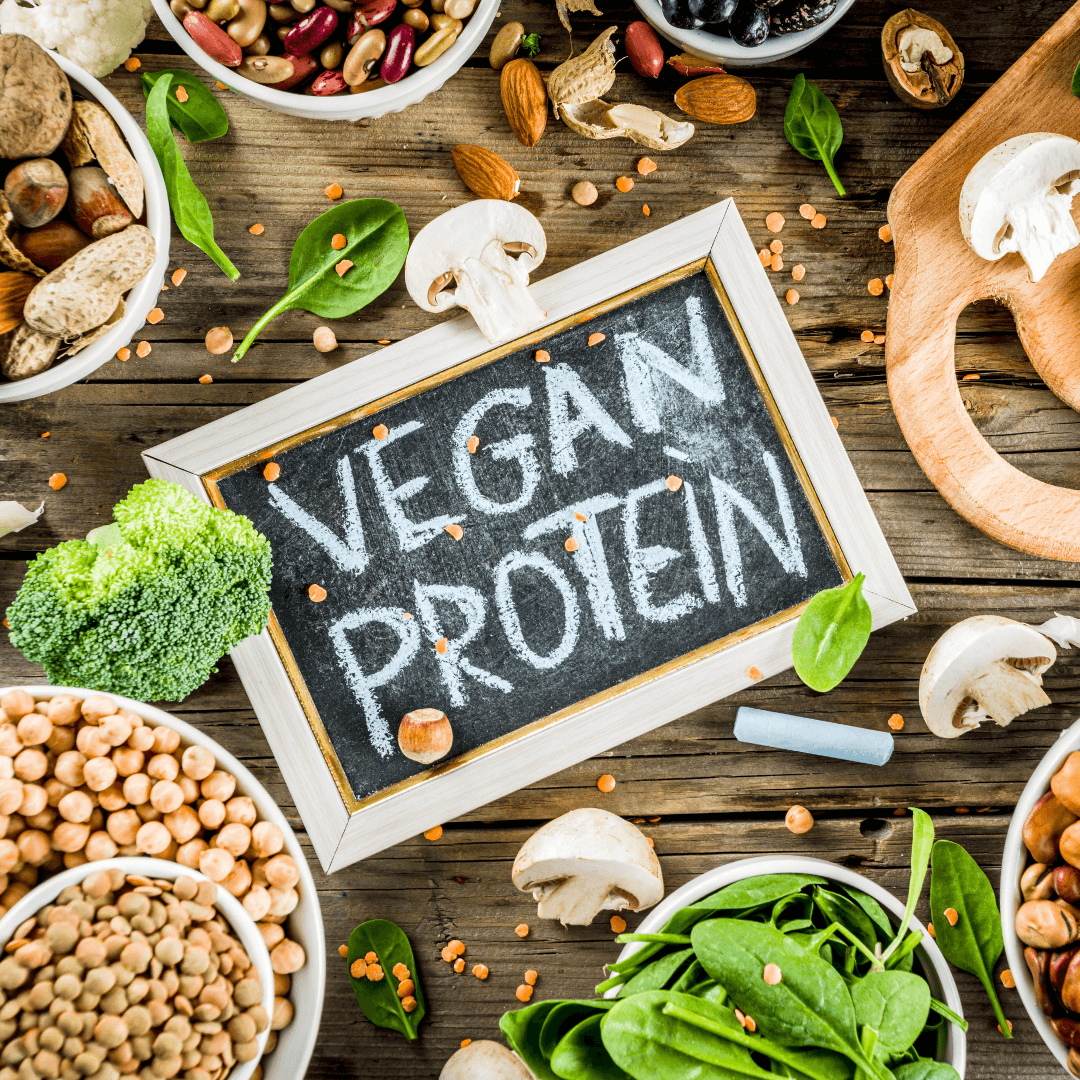
3. Protein
The remaining quarter of your plate should be reserved for plant-based protein sources like tofu, tempeh, seitan, legumes, and plant-based meat alternatives. These foods provide the necessary amino acids for muscle maintenance and overall health.
4. Healthy Fats
Include a source of healthy fats like nuts, seeds, avocados, or a drizzle of olive oil for cooking or dressing your vegetables and grains. These fats contribute to satiety and help absorb fat-soluble vitamins.
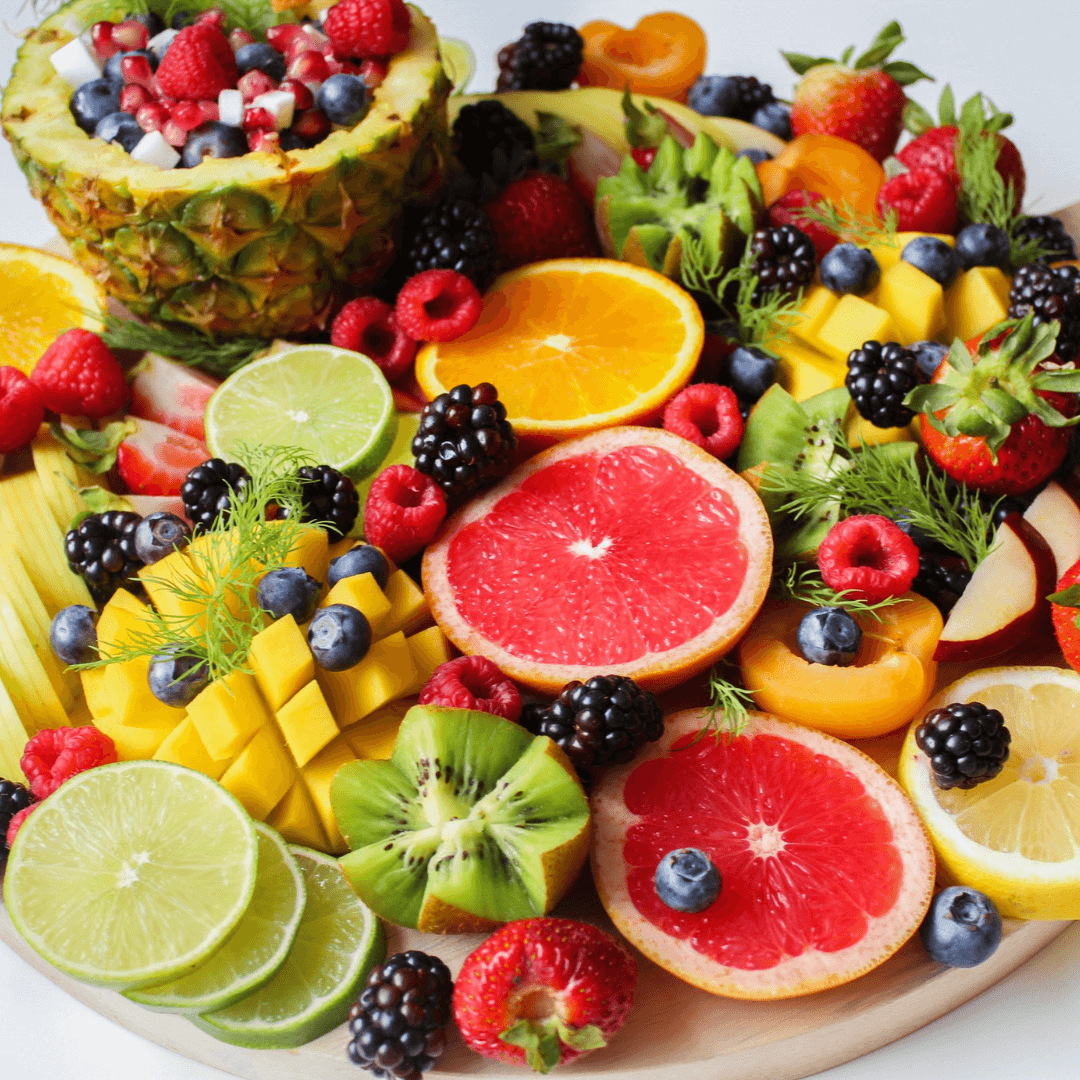
5. Fruits
While not depicted on the plate, fruits are essential to your daily vegan diet. You can enjoy them as snacks or desserts or in smoothies. Fruits provide natural sweetness and a wide range of vitamins and antioxidants.
6. Supplements
Depending on individual nutritional needs and sun exposure, vegans may need to supplement with vitamin B12, vitamin D, and omega-3 fatty acids to ensure they meet their nutrient requirements.
The Vegan Plate Method encourages variety, balance, and portion control. It's a flexible framework that can be adapted to different dietary preferences and cultural backgrounds.
This approach helps vegans create well-rounded and satisfying meals that promote overall health and ensure they get nutrients.
An Overview Of What Vegans Eat Daily
Vegans follow a plant-based diet, excluding all animal products from their meals. A typical daily vegan diet is diverse, colourful, and nutrient-rich.
Here's a glimpse into what vegans often consume:
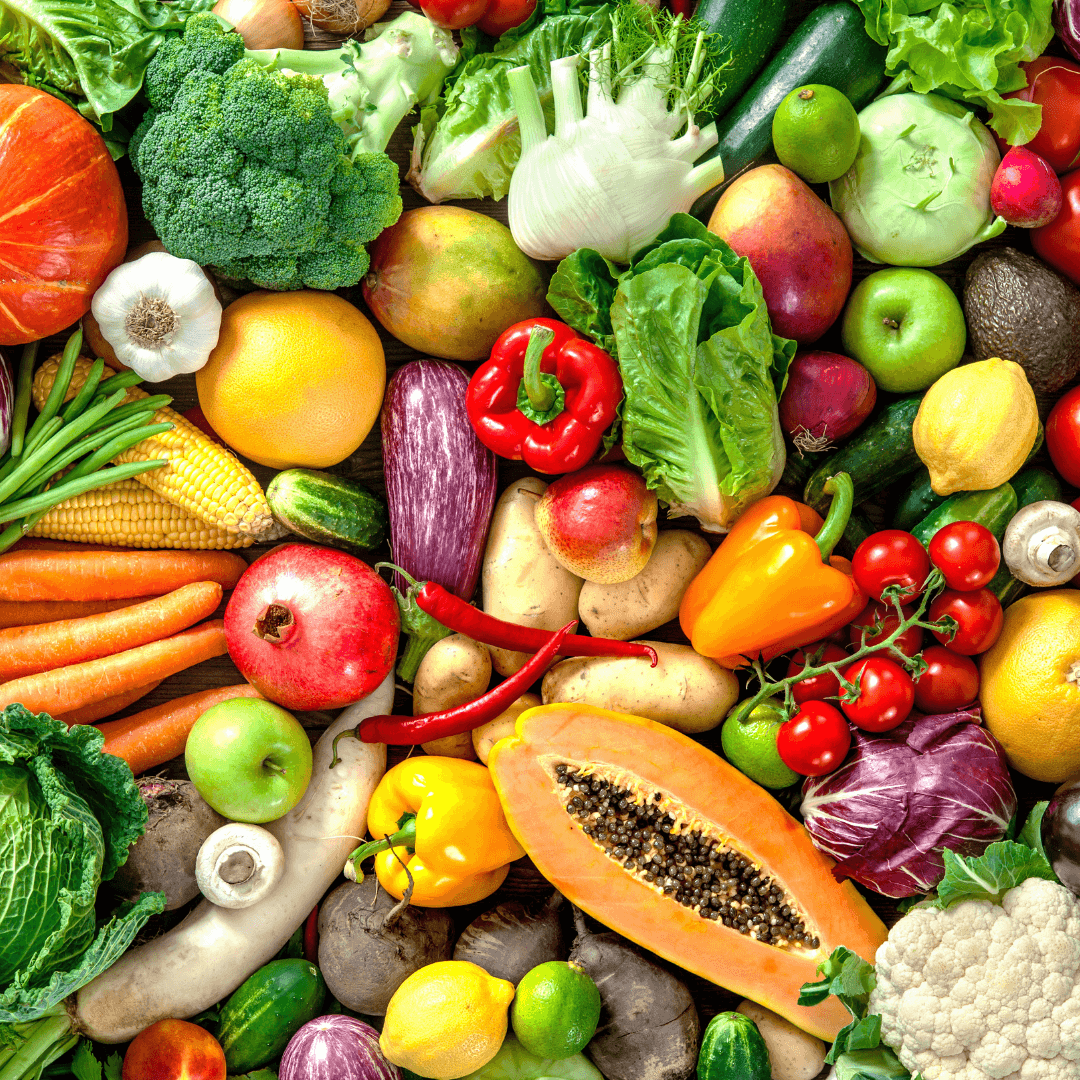
1. Fruits And Vegetables
Fruits and vegetables are a vegan diet's vibrant heart and soul. They offer an extraordinary spectrum of colours, flavours, and nutrients that form the essence of plant-based eating.
Whether you choose fresh produce, frozen selections, or canned varieties, these botanical gems deliver health benefits.
Think of them as nature's paintbrush, turning your plate into a canvas of rich and diverse hues, from the deep purples of eggplants to the fiery reds of bell peppers.
This colourful symphony provides a symposium of essential vitamins, minerals, and antioxidants. Oranges and kale provide vitamin C for immunity.
At the same time, sweet potatoes and carrots grace your palate with the gift of beta-carotene, a precursor to vitamin A, which is essential for healthy vision.
The diversity of fruits and vegetables ensures a dynamic blend of nutrients, ensuring your vegan journey isn't just nutritious but a delicious and visually stunning adventure.
Whether starring in salads, roasted to perfection, or blended into creamy smoothies, these plant-based treasures embody the essence of well-being as they flood your body with many health-enhancing compounds.
They're the vibrant soul of your plate, adding not just colour but vitality to your daily meals, making every bite an exquisite celebration of life.
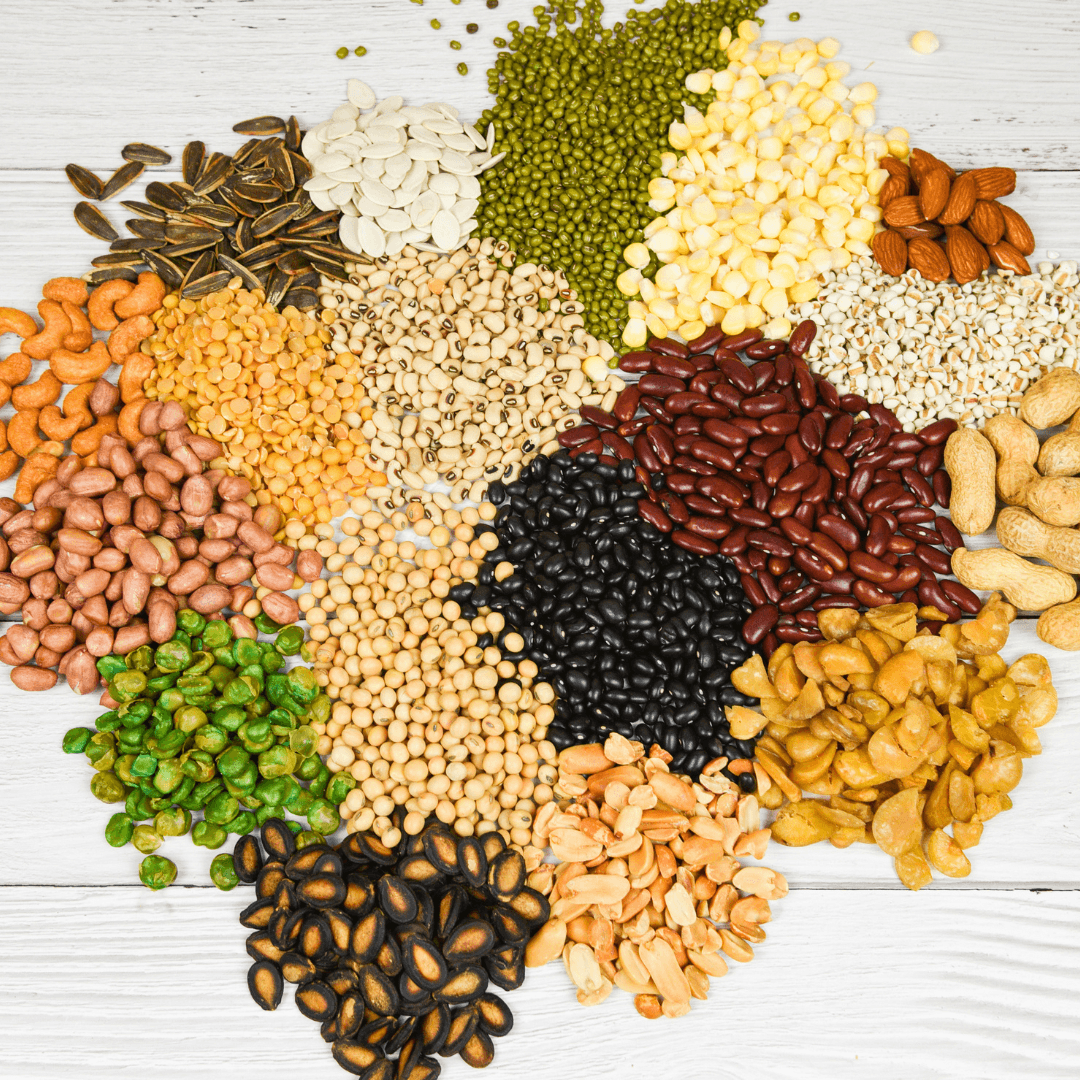
2. Whole Grains
Whole grains serve as the sturdy foundation of a vegan diet, providing an abundance of fibre and complex carbohydrates.
These wholesome wonders, including brown rice, quinoa, whole wheat pasta, and oats, are like architectural pillars supporting a vibrant and energetic lifestyle.
Their journey from farm to plate preserves the entirety of the grain – the bran, endosperm, and germ – ensuring you receive the full spectrum of nutrients.
The rich, nutty taste of quinoa makes it a versatile choice, while brown rice adds earthy depth to your meals. Whole wheat pasta boasts a hearty texture; oats offer nourishment and flexibility. These grains are not merely food.
They are the architects of your energy, meticulously crafting a steady and sustained fuel release for your day. The fibre in these grains is your dietary ally, promoting digestive health and providing that full and satisfied feeling.
Complex carbohydrates are the slow-burning logs on your body's metabolic fire, keeping your energy levels stable and your mind sharp.
They don't just nourish your body; they form the cornerstone of plant-based vitality, ensuring that every meal is a stepping stone to a healthier and more sustainable life.
So, as you savour the delightful chewiness of whole grains or embrace the silky smoothness of a well-cooked quinoa, remember that these are not mere ingredients but the pillars of a robust, vibrant, and compassionate diet.
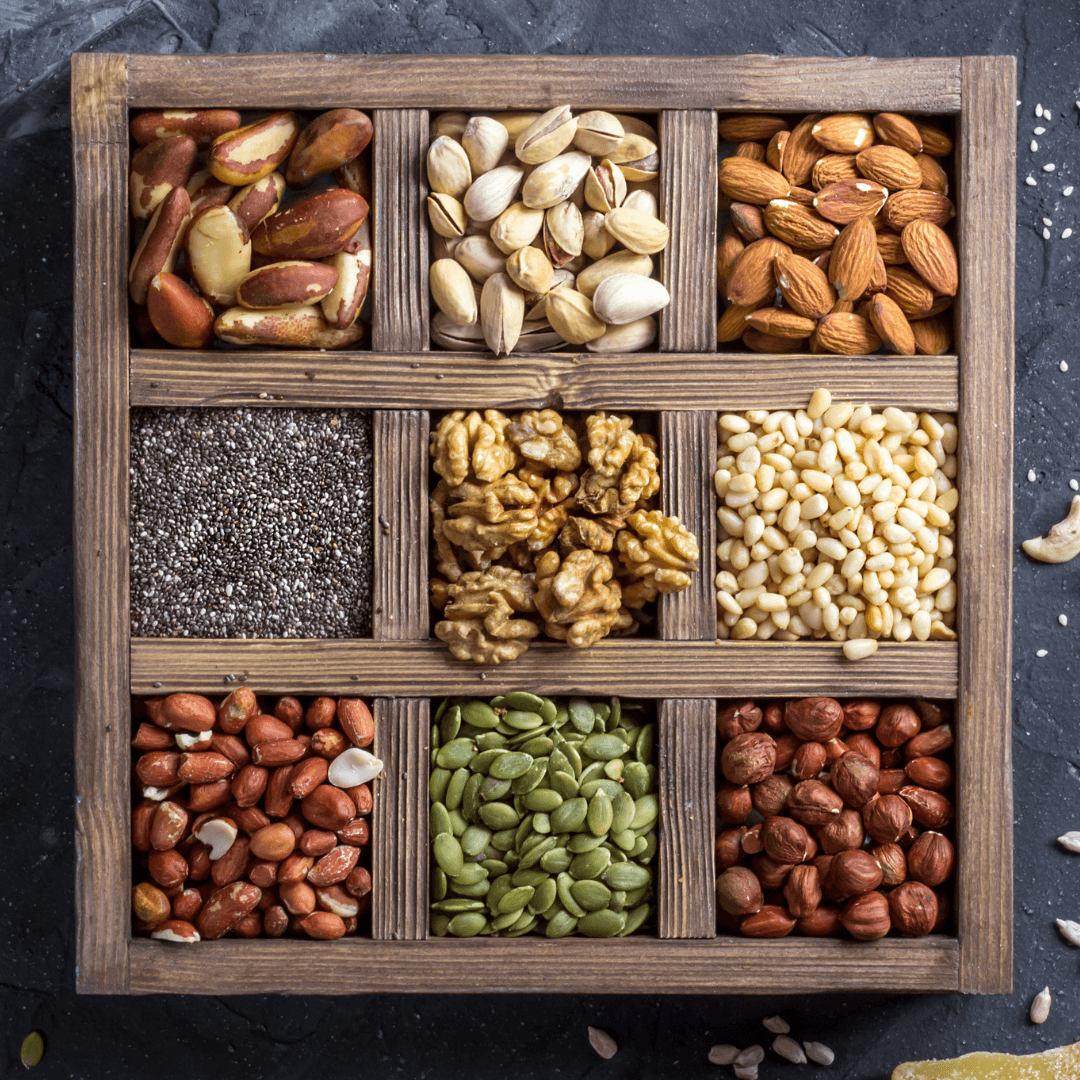
3. Nuts And Seeds
Nuts and seeds, like tiny nutritional powerhouses, play a multifaceted role in a vegan diet. They're not just for garnishing dishes; they're the unsung heroes of plant-based versatility.
Almonds, walnuts, flaxseeds, chia seeds, and their kin bring a delightful crunch, a hearty richness, and a wealth of essential nutrients to your meals.
These diminutive wonders wear multiple hats, gracing your salads and smoothie bowls while moonlighting as the architects of dairy alternatives like almond milk and cashew cheese.
Take almonds, for instance; their distinct blend of creamy and crunchy transforms them into the perfect companions for your morning granola or the base for a velvety almond butter.
Then there's the humble flaxseed, which, when ground, takes on a gelatinous quality that helps bind ingredients in recipes, making it a great egg substitute.
With their exceptional water-absorbing capacity, Chia seeds work culinary magic in creating satisfying puddings and thickening smoothies. Nuts and seeds are also known for their rich omega-3 fatty acids, which are vital for heart and brain health.
They are the hidden architects of plant-based dairy, offering the creaminess and mouthfeel so often associated with animal products.
This is where the true charm of nuts and seeds lies – their ability to transform, elevate, and enrich. They don't just garnish; they impart texture, flavour, and that comforting fullness you seek in a balanced vegan diet.
So, when you sprinkle chia seeds on your yogurt or savour a slice of walnut-studded bread, remember that you're not just enjoying a meal but experiencing a symphony of taste, nutrition, and culinary ingenuity, all in one delicious handful.
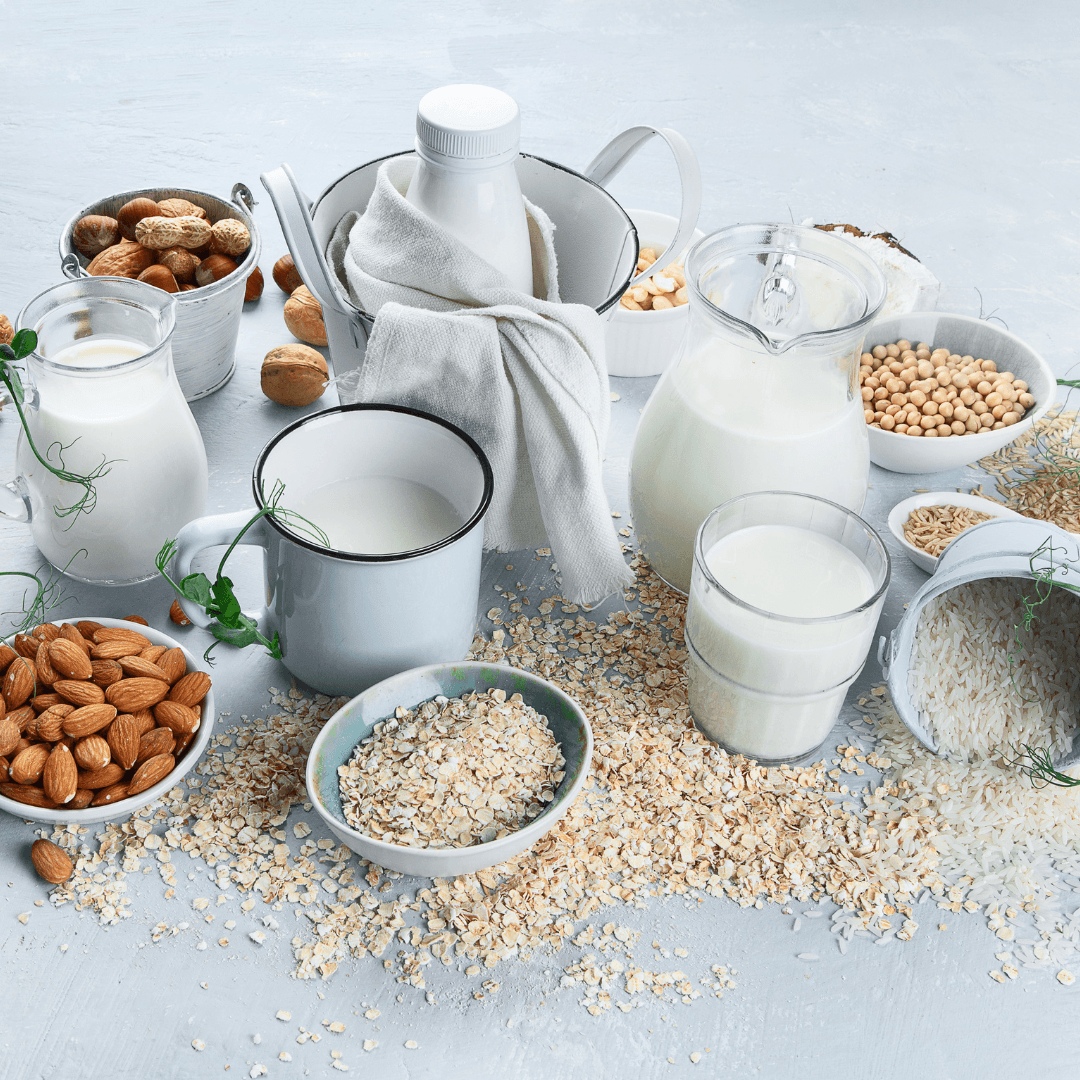
4. Plant-Based Milk
Plant-based milk, often the crown jewel of a vegan's morning routine, has evolved into a diverse world of creamy delights. Soy, almond, oat, and coconut milk are the stars of this dairy-free galaxy, each offering its unique charm and versatility.
Soy milk, with its neutral yet slightly nutty flavour, is often the choice for those seeking a milk alternative for baking and cooking. Its proteins lend themselves to frothy cappuccinos and stable salad dressings.
Almond milk, the delicate darling, provides a gentle, slightly sweet taste with a hint of roasted nuts. It's the go-to option for something light and refreshing to splash over cereal or enjoy in a chilled glass.
Oat milk, the trendy newcomer, boasts a natural sweetness and a fantastic thick, creamy texture in coffee or tea. It also shines in smoothies, thanks to its ability to create a velvety consistency.
Coconut milk, the tropical indulgence, delivers a rich and full-bodied flavour, transporting your taste buds to far-off islands. It's often the choice for luscious curries, decadent desserts, and tropical-inspired cocktails.
But the beauty of these plant-based milks isn't limited to taste; they offer versatility and nutritional benefits in the kitchen.
To match the nutrition in dairy milk, most are fortified with important vitamins and minerals, such as calcium and vitamin D. They're also lactose-free, making them a fantastic choice for the lactose-intolerant.
From your morning latte to creamy soups and freshly baked goods, plant-based milk adds a touch of dairy-free magic to every culinary endeavour.
Each variety brings unique character to your dishes, offering many possibilities for crafting delightful and nutritious vegan cuisine.
So, whether you're sipping a comforting cup of almond milk hot chocolate or expertly whipping up a batch of oat milk pancakes, plant-based milk is the luscious liquid that makes your vegan kitchen come to life.

5. Sweets And Desserts
In the world of vegan sweets and desserts, there's a delightful array of choices to satisfy your sweet tooth while upholding your compassionate dietary decisions.
Vegan desserts encompass an assortment of treats, ranging from the naturally sweet, like fruit salads bursting with vibrant flavours, to the indulgent, such as dairy-free ice creams that come in an endless parade of delectable flavours.
Cookies and cakes are pillars of the vegan dessert realm. Expertly crafted using plant-based ingredients, these tasty delights have all the taste and texture you'd expect from traditional recipes.
Vegan bakers employ egg substitutes like flaxseeds, applesauce, or aquafaba (the liquid from canned chickpeas) to create the same moisture and binding effect, resulting in moist, tender cakes and chewy, satisfying cookies.
When it comes to vegan ice cream, options are equally endless. Creamy concoctions made from almonds, coconut, or cashews are the perfect base for your favorite flavours.
Whether it's the rich decadence of chocolate, the refreshing zing of mint, or the comforting warmth of caramel, you'll find an assortment of dairy-free delights to scoop into your bowl or cone.
But it's not all about replacing traditional treats with vegan alternatives. Nature itself offers a sweet bounty that many vegans embrace.
Fresh fruit salads are a perfect example, showcasing the natural sweetness of fruits in their prime. Whether you're savouring the juiciness of watermelon, the tang of citrus, or the decadence of ripe mangoes, these desserts satisfy your sweet cravings and provide a wealth of essential vitamins and fibre.
The world of vegan desserts is a testament to the versatility and creativity that flourishes within plant-based kitchens.
From no-fuss fruit bowls to the intricate layers of a dairy-free tiramisu, vegan sweets is a diverse, flavorful, and cruelty-free wonderland where indulgence meets ethical consciousness.
So whether you're baking with compassion or crafting refreshing fruit medleys, the vegan dessert world is ripe for exploration, offering sweet satisfaction with every bite.
Conclusion
In conclusion, the daily life of a vegan is a celebration of variety, compassion, and conscious choices. The beauty of a vegan diet lies in its adaptability.
From sumptuous salads to hearty stews, from classic sandwiches to innovative plant-based creations, vegans have embraced the art of culinary creativity.
The choices are abundant, allowing for endless exploration and experimentation. Beyond the plate, the essence of veganism extends to a profound sense of compassion for animals and a commitment to sustainable living.
It's a lifestyle that seeks to reduce harm and make mindful decisions that positively impact the world. For those considering transitioning to a vegan lifestyle, the daily fare is not just about what you eat but also a remarkable journey towards a more conscious, compassionate, and healthier way of living.
It's a path of culinary discoveries, ethical reflections, and environmental stewardship that enriches the lives of vegans every single day.
I trust you enjoyed reading the article ” An Overview Of What Vegans Eat Daily. Please stay tuned. More blog posts will be posted very shortly.
JeannetteZ
>>>Please click here to read my Vegan Travel Guides To World Destinations<<<
>>>Want To Learn How To Create Delicious, Cruelty-Free, Healthy AND 100% Vegan Meals? Try These Awesome Vegan Cooking Courses With A Free 7-DAY MEMBERSHIP<<<
Your Opinion Is Important To Me
Do you have thoughts, ideas, or questions? I would love to hear from you. Please leave me your questions, experiences, and remarks about An Overview Of What Vegans Eat Daily in the comments section below. You can also email me at Jeannette@LivingTheVeganLifestyle.org.
Disclosure
This post may contain affiliate links. I earn from qualifying purchases as an Amazon Associate and through other affiliate programs. Please read my full disclosure.
Here are some links to some of my favourite articles:
7 Best Vegan Candy Bars To Try



